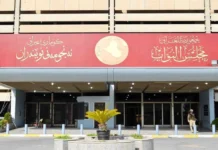Tishwash: UrgentAl-Sudani visits Tehran today
Prime Minister Mohammed Shia Al-Sudani will visit today, Tuesday, to participate in the swearing-in ceremony of the new Iranian President, Masoud Pezeshkian, which will take place in the Islamic Shura Council {Parliament}.
Foreign delegations will continue to arrive in Tehran from yesterday until the remaining hours of the swearing-in ceremony of the ninth Iranian president.
It is worth noting that the implementation ceremony of President Masoud Pezeshkian’s decree was held the day before yesterday, Sunday, and the text of the fourteenth presidential decree was delivered to the president-elect by the Leader of the Islamic Revolution in Iran.
According to Article 121 of the Iranian Constitution, the President of the Republic must take the constitutional oath before the Glorious Word of God and in the presence of members of Parliament, members of the Guardian Council, and the head of the judiciary in the Islamic Consultative Assembly.
The swearing-in ceremony of President Masoud Pezeshkian will be held in the Islamic Consultative Assembly on Tuesday evening, and according to Alireza Sharifi, the executive deputy of the parliament, more than 70 foreign delegations from different countries will participate in this ceremony. link
Tishwash: In the presence of Al-Sudani.. 3 files bring the framework together at the nightly negotiating table
The Coordination Framework, which includes the Shiite forces forming the government of Mohammed Shia al-Sudani, is scheduled to hold an important meeting on Monday evening, with the attendance of all its leaders, in addition to the Prime Minister.
A leader in the framework told Shafaq News Agency, “The Coordination Framework will hold a meeting in an hour from now, in the presence of its leadership and the Prime Minister, to discuss a number of important topics and issues on the political scene.”
The leader added, “The meeting of the framework leaders will discuss the issue of the position of the Speaker of the House of Representatives and agree to set a record date for holding the session to elect the president.”
He explained that “the meeting will also discuss the file of forming local governments in the provinces of Diyala and Kirkuk, in addition to discussing with Al-Sudani the file of the Turkish incursion into Iraqi territory.”
Despite the passage of more than 8 months, the Sunni political forces have not succeeded in agreeing on an alternative candidate for Parliament Speaker Mohammed al-Halbousi .
The parliament failed five times in a row to resolve the issue, in light of the division between the political parties in supporting one of the candidates for the position, namely Mahmoud Al-Mashhadani, the candidate of the Progress Party, and Salem Al-Issawi, the candidate of the Sunni parties (Sovereignty and the Azm and Al-Hasm alliances), who obtained the majority of votes during the last parliament session .
A few days ago, the Azm Alliance, led by Muthanna al-Samarrai, warned the Shiite forces against continuing to obstruct the election of the Parliament Speaker .
The leader of the coalition, Haider Al-Mulla, told Shafaq News Agency, “The talk about achieving a Sunni-Sunni consensus is an attempt to obstruct the election of the Speaker of the Council of Representatives. Throughout the life of the political process in Iraq, there has been no consensus or agreement on choosing any of the three presidencies.” link
************
Tishwash: Article 140 raises controversy again.. Calls to delay its implementation and take into account the “sensitivity of the situation”
MP Mudhar Al-Karwi called, today, Monday (July 29, 2024), to delay the implementation of Article 140 in 38 villages in eastern Iraq, stressing that the sensitivity of the situation must be taken into account .
Al-Karwi said in an interview with Baghdad Today, “The Committee for the Implementation of Article 140 recently issued a decision regarding agricultural contracts in 38 villages located within the vicinity of Khanaqin District in Diyala Governorate. This is a sensitive issue and requires flexible procedures because hundreds of farmers have official contracts that extend for decades.”
Al-Karwi called on the Prime Minister to “issue an order to delay the implementation of the decision of the Committee for the Implementation of Article 140 and to give an opportunity to review the contracts in the villages covered by a higher committee affiliated with the Ministry of Agriculture and the rest of the parties to avoid any injustice or unfairness that affects Arab farmers. The sensitivity of the situation must be taken into account and the matter must be done according to fair and just principles to avoid any confusion.”
He pointed out that “waiting is the most appropriate thing at the moment and agreeing on specific procedures that will lead to achieving justice and fairness for all parties and that no farmer will be wronged, especially since the residents of these villages have been living there for decades.”
It is noteworthy that the Article 140 Implementation Committee, headed by Hadi al-Amiri, recently issued a decision regarding agricultural contracts in the villages of Khanaqin and returning them to Kurdish farmers. link
Tishwash: Government Advisor: Adopting budget schedules has become a reality and does not affect financial obligations
The financial advisor to the Prime Minister, Mazhar Muhammad Salih, confirmed today, Tuesday, that the budget schedules have become a reality, and issuing instructions is a procedural matter that does not affect financial obligations.
Saleh said, in an interview with the Iraqi News Agency, followed by “Al-Eqtisad News”, that “the legal basis for the current fiscal year 2024 is something that has been legislated and approved primarily, based on the provisions of the federal general budget for the years 2023, 2025, 2024 issued by Law No. 13 of 2023, which was published on June 26, 2023 in the Official Gazette.”
He explained that “what is stipulated in Article Two/77 of the law includes the executive authority submitting the financial tables for the two fiscal years 2024, 2025 to enable the House of Representatives to approve them sequentially,” noting that “this was achieved in the fiscal year 2024.” He
pointed out that “the three-year federal general budget was implemented for the first time in the country, which was based in its approval on one of the articles included in the provisions of the Federal Financial Management Law No. 6 of 2019, as amended, which authorized the work of a financial plan consisting of a general budget for three fiscal years.”
He added that “the legal options available to implement the provisions of the federal general budget have become more flexible for the federal financial authority, in addition to the availability of the federal financial management law itself, which allows financial transactions even if any approval of the general budget formalities is delayed in principle, especially allowing continued spending or disbursement on investment projects approved in the three-year general budget as ongoing projects, as well as operational spending, or any financial transactions stipulated in the three-year general budget law.”
He added, “Despite this, the adoption of the financial tables for the current fiscal year 2024, which were approved by the House of Representatives earlier this year, has become a reality, and issuing instructions for their implementation is a procedural matter that does not affect the obligations of the fiscal year itself, as these instructions are in all cases consistent with the emerging financial transactions when issued.”
He added that “the Ministry of Finance had announced earlier this month the issuance of financial bonds (achievement bond) as a source of financing for the budget by borrowing from the local financial market worth 1.5 trillion dinars,” stressing that “spending on operating expenses such as salaries, pensions, social care, debt services, and others is ongoing, in addition to the continued financing of ongoing investment projects and those under implementation.”
He pointed out that “all of these activities are financial activities in which spending has not stopped, which is consistent with the legal work rules that came with the three-year federal general budget, with high flexibility, transparency, and governance.”
He noted that “the instructions for implementing the general budget schedules for the fiscal year 2024 will touch upon some of the developments and partial financial transactions that have been newly created or adapted, and not the faculties of public finance, and that the financial activity in the country with its three pillars: revenues, expenditures, and deficit management is proceeding in a consistent and harmonious manner and in accordance with the objectives of the three-year general budget law, and that the executive and legislative authorities are in continuous communication and high coordination to ensure the achievement of public interests without interruption link





